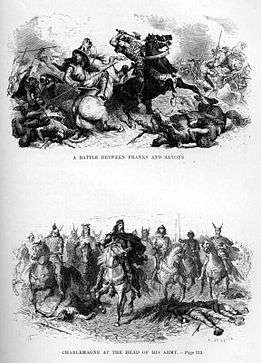784
| Millennium: | 1st millennium |
|---|---|
| Centuries: | 7th century · 8th century · 9th century |
| Decades: | 750s · 760s · 770s · 780s · 790s · 800s · 810s |
| Years: | 781 · 782 · 783 · 784 · 785 · 786 · 787 |
| 784 by topic | |
| Politics | |
| State leaders – Sovereign states | |
| Birth and death categories | |
| Births – Deaths | |
| Establishment and disestablishment categories | |
| Establishments – Disestablishments | |
| Gregorian calendar | 784 DCCLXXXIV |
| Ab urbe condita | 1537 |
| Armenian calendar | 233 ԹՎ ՄԼԳ |
| Assyrian calendar | 5534 |
| Bengali calendar | 191 |
| Berber calendar | 1734 |
| Buddhist calendar | 1328 |
| Burmese calendar | 146 |
| Byzantine calendar | 6292–6293 |
| Chinese calendar | 癸亥年 (Water Pig) 3480 or 3420 — to — 甲子年 (Wood Rat) 3481 or 3421 |
| Coptic calendar | 500–501 |
| Discordian calendar | 1950 |
| Ethiopian calendar | 776–777 |
| Hebrew calendar | 4544–4545 |
| Hindu calendars | |
| - Vikram Samvat | 840–841 |
| - Shaka Samvat | 705–706 |
| - Kali Yuga | 3884–3885 |
| Holocene calendar | 10784 |
| Iranian calendar | 162–163 |
| Islamic calendar | 167–168 |
| Japanese calendar | Enryaku 3 (延暦3年) |
| Javanese calendar | 679–680 |
| Julian calendar | 784 DCCLXXXIV |
| Korean calendar | 3117 |
| Minguo calendar | 1128 before ROC 民前1128年 |
| Nanakshahi calendar | −684 |
| Seleucid era | 1095/1096 AG |
| Thai solar calendar | 1326–1327 |
| Wikimedia Commons has media related to 784. |

King Charlemagne and the Saxons (1869)
Year 784 (DCCLXXXIV) was a leap year starting on Thursday (link will display the full calendar) of the Julian calendar. The denomination 784 for this year has been used since the early medieval period, when the Anno Domini calendar era became the prevalent method in Europe for naming years.
Events
By place
Europe
- Saxon Wars: King Charlemagne begins a campaign in northern Saxony. He ravages Eastphalian territory as far as the Elbe River while his son, Charles the Younger, defeats a Saxon force in the Lippe Valley. Bad weather hinders Charlemagne's winter campaign in southern Saxony.[1]
- Winter – Charlemagne returns to Eresburg and builds a church, probably on the site of the Irminsul (a pagan religious site). Frankish forces based at Eresburg attack 'rebel' Saxon settlements and take control of the roads. Charlemagne himself takes part in some of these raids.[2]
Arabian Empire
- Abd al-Rahman I, Muslim emir of Córdoba (Al-Andalus), begins with the construction of the Prayer Hall, the Great Mosque of Córdoba. He uses the mosque (originally called Aljama Mosque) as an adjunct to his palace and names it in honour of his wife.
Asia
- The Japanese begin a war against the Ainu – in the north on the main island of Honshu. Emperor Kanmu wishes to be free of influence from the Buddhist monasteries around Nara (then called Heijō), and moves the capital to Nagaoka, ending the Nara period.
By topic
Religion
- August 30 – Paul IV abdicates as patriarch of Constantinople.
- December 25 – Tarasios is elected patriarch of Constantinople.
Births
- Ibn Sa'd al-Baghdadi, Muslim historian (d. 845)
- Li Jue, chancellor of the Tang Dynasty (approximate date)
- Theodrada, daughter of Charlemagne (approximate date)
Deaths
- May 4 – Arbeo, bishop of Freising
- July 16 – Fulrad, Frankish abbot (b. 710)
- Alberic, archbishop of Utrecht
- Autpert Ambrose, Frankish abbot
- Isa ibn Musa, Muslim governor (or 783)
- Paul IV, patriarch of Constantinople
- Vergilius, bishop of Salzburg
References
This article is issued from Wikipedia - version of the 9/22/2016. The text is available under the Creative Commons Attribution/Share Alike but additional terms may apply for the media files.